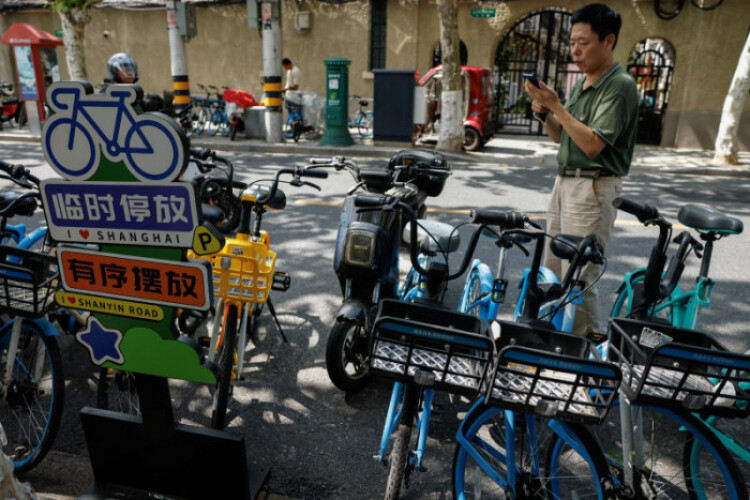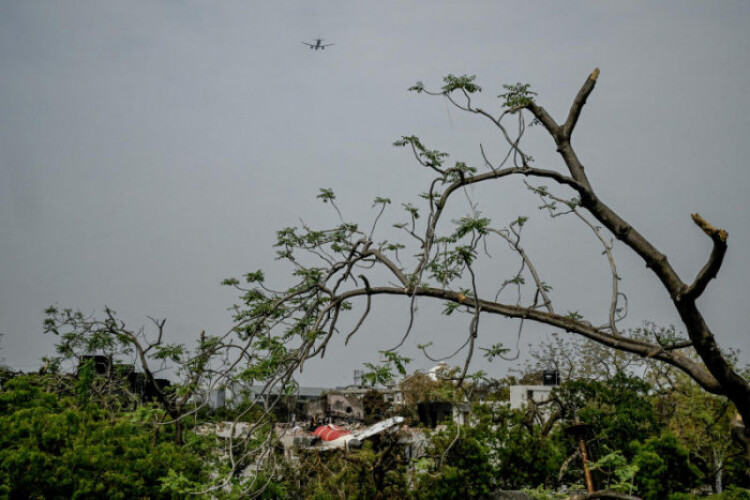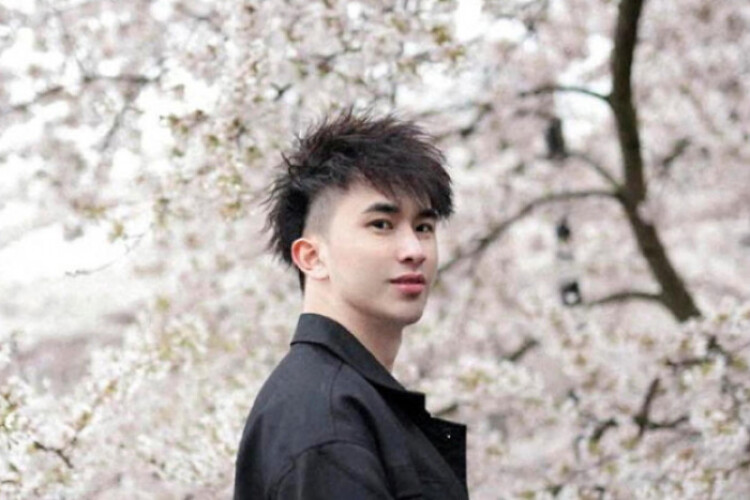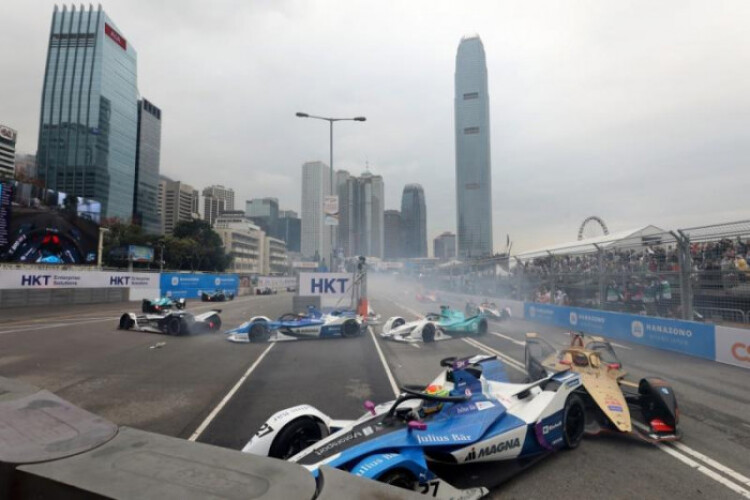
A nighttime biking craze has sparked a backlash from Chinese officials concerned about traffic chaos and caught off guard by a surprise mass-cycle of university students — a demographic with a history of protest.
Thousands of cyclists flooded a six-lane highway this weekend, according to videos that swept Chinese social media, as they made the 50-kilometre trip from Zhengzhou to an ancient city in central Henan. Students overwhelmed the town of Kaifeng, with some riders dumping their rental bikes on arrival, local media reported.
Just days ago, the ruling Communist Party mouthpiece People’s Daily had hailed the nascent nocturnal trend as “one way university students were breathing life into China’s tourism scene”. While some students this weekend carried Chinese flags and chanted nationalist slogans such as “long live the party” during the trip, the mass gathering appeared to have flipped the official sentiment.
The Ministry of Emergency Management issued a notice on its WeChat account on Saturday reminding cyclists to comply with traffic and bicycle rules. Bike sharing apps warned they’d remotely freeze any two-wheelers taken beyond Zhengzhou. One university stipulated students now needed exit permits to leave campus, according to the state-affiliated Jimu News in neighbouring Hubei.
“Why are you closing off the schools? Who will go night cycling on Monday and Tuesday?” one user complained on the platform. “I’ve had it, when will it be unsealed?” A hashtag about such controls attracted some 500,000 views on China’s X-like Weibo as of Monday.
Media channel Shenyang News emphasised the road safety and traffic congestion issues around the night cycling phenomenon, saying it was understandable for youths to be wild, but “once is enough”. One blogger pointed out other reasons for authorities to crack down, such as the risk a group brought together for revelry can turn from an “unconscious organisation” to one with a sense of purpose.
“Any collective action by Chinese youth has the potential to become political, especially in the context of persistent high youth unemployment,” said Diana Fu, an associate professor of political science at the University of Toronto’s Munk School of Global Affairs & Public Policy. “If their wrath turns toward the party-state, it may trigger a social movement that rivals that of the anti-Covid lockdown protests.”
President Xi Jinping’s government has cracked down on the space for large gatherings outside the state’s direct control, as it moved to shore up the party’s control. University students are a particularly sensitive slice of society, after leading both the Tiananmen Square pro-democracy protests of 1989 and nationwide anti-Covid control demonstrations in late 2022 that at times called for the downfall of China’s top leader.
Even Halloween costumes — something once widely permitted — were restricted in some Chinese cities last month, after people previously used subversive outfits to make veiled criticisms of the government.
One article titled “The Energy of College Students With Nowhere to Be Released Is a Big Problem” appeared to have been censored over the weekend, returning a message on the WeChat messaging app saying it was suspected of violating regulations. “If night riding is not allowed to Kaifeng, there must be an outlet,” according to the Get Common Sense account written by former-journalist Xiang Dongliang.
Another piece by Xiang on Sunday — criticising Zhengzhou-based Henan University of Engineering for restricting students from leaving the campus — also appeared to have been censored.
Camellia Chen, 21, joined the cycling frenzy on Tuesday, with the unemployed university graduate excited to embrace a movement people online are calling “go crazy once”.
“Finding a job is a very difficult thing for me. I want to find a job related to my major, but salaries are not very high,” Chen said, adding she wanted to make the most of her resulting free time. “After we start working, we may not necessarily have this passion anymore.”
The craze for nighttime cycling began back in June, when four female students from Zhengzhou rented a bike and travelled to Kaifeng to eat guantangbao, a popular kind of soup dumpling.
Freebies offered in Kaifeng spurred interest. “They provided us with free late-night snacks, breakfast and a place to rest,” Chen said, noting college students qualify for a free annual pass to Qingming Shanghe Garden, a theme park with Song Dynasty architecture.
Regions in China are being encouraged to pivot to the so-called experience economy, as their nation’s growth trajectory wobbles. The town of Zibo in eastern China was swarmed last year by young people in pursuit of cheap barbecue, while Tianshui in Gansu province was inundated by foodies wanting to try its numbing dry pot.
By Saturday, it seemed like officials in Henan were cooling on the idea. One kung-fu-themed spot in Kaifeng issued a notice on WeChat saying it expected tourist flow to hit the maximum level and asked tourists to book in advance and stagger their visiting plans. Millennium City Park — another popular destination — issued similar guidance and said it would impose controls to tourist flows.
“The collective cycling event in Henan is illustrative of the party-state’s sensitivity to the threat of collective action,” said Kevin Slaten, who leads the China Dissent Monitor project. “The party-state is so attuned to the risk of collective action, particularly from students, that it instinctively conducts preventive repression like this.”
Thousands of cyclists flooded a six-lane highway this weekend, according to videos that swept Chinese social media, as they made the 50-kilometre trip from Zhengzhou to an ancient city in central Henan. Students overwhelmed the town of Kaifeng, with some riders dumping their rental bikes on arrival, local media reported.
Just days ago, the ruling Communist Party mouthpiece People’s Daily had hailed the nascent nocturnal trend as “one way university students were breathing life into China’s tourism scene”. While some students this weekend carried Chinese flags and chanted nationalist slogans such as “long live the party” during the trip, the mass gathering appeared to have flipped the official sentiment.
The Ministry of Emergency Management issued a notice on its WeChat account on Saturday reminding cyclists to comply with traffic and bicycle rules. Bike sharing apps warned they’d remotely freeze any two-wheelers taken beyond Zhengzhou. One university stipulated students now needed exit permits to leave campus, according to the state-affiliated Jimu News in neighbouring Hubei.
“Why are you closing off the schools? Who will go night cycling on Monday and Tuesday?” one user complained on the platform. “I’ve had it, when will it be unsealed?” A hashtag about such controls attracted some 500,000 views on China’s X-like Weibo as of Monday.
Media channel Shenyang News emphasised the road safety and traffic congestion issues around the night cycling phenomenon, saying it was understandable for youths to be wild, but “once is enough”. One blogger pointed out other reasons for authorities to crack down, such as the risk a group brought together for revelry can turn from an “unconscious organisation” to one with a sense of purpose.
“Any collective action by Chinese youth has the potential to become political, especially in the context of persistent high youth unemployment,” said Diana Fu, an associate professor of political science at the University of Toronto’s Munk School of Global Affairs & Public Policy. “If their wrath turns toward the party-state, it may trigger a social movement that rivals that of the anti-Covid lockdown protests.”
President Xi Jinping’s government has cracked down on the space for large gatherings outside the state’s direct control, as it moved to shore up the party’s control. University students are a particularly sensitive slice of society, after leading both the Tiananmen Square pro-democracy protests of 1989 and nationwide anti-Covid control demonstrations in late 2022 that at times called for the downfall of China’s top leader.
Even Halloween costumes — something once widely permitted — were restricted in some Chinese cities last month, after people previously used subversive outfits to make veiled criticisms of the government.
One article titled “The Energy of College Students With Nowhere to Be Released Is a Big Problem” appeared to have been censored over the weekend, returning a message on the WeChat messaging app saying it was suspected of violating regulations. “If night riding is not allowed to Kaifeng, there must be an outlet,” according to the Get Common Sense account written by former-journalist Xiang Dongliang.
Another piece by Xiang on Sunday — criticising Zhengzhou-based Henan University of Engineering for restricting students from leaving the campus — also appeared to have been censored.
Camellia Chen, 21, joined the cycling frenzy on Tuesday, with the unemployed university graduate excited to embrace a movement people online are calling “go crazy once”.
“Finding a job is a very difficult thing for me. I want to find a job related to my major, but salaries are not very high,” Chen said, adding she wanted to make the most of her resulting free time. “After we start working, we may not necessarily have this passion anymore.”
The craze for nighttime cycling began back in June, when four female students from Zhengzhou rented a bike and travelled to Kaifeng to eat guantangbao, a popular kind of soup dumpling.
Freebies offered in Kaifeng spurred interest. “They provided us with free late-night snacks, breakfast and a place to rest,” Chen said, noting college students qualify for a free annual pass to Qingming Shanghe Garden, a theme park with Song Dynasty architecture.
Regions in China are being encouraged to pivot to the so-called experience economy, as their nation’s growth trajectory wobbles. The town of Zibo in eastern China was swarmed last year by young people in pursuit of cheap barbecue, while Tianshui in Gansu province was inundated by foodies wanting to try its numbing dry pot.
By Saturday, it seemed like officials in Henan were cooling on the idea. One kung-fu-themed spot in Kaifeng issued a notice on WeChat saying it expected tourist flow to hit the maximum level and asked tourists to book in advance and stagger their visiting plans. Millennium City Park — another popular destination — issued similar guidance and said it would impose controls to tourist flows.
“The collective cycling event in Henan is illustrative of the party-state’s sensitivity to the threat of collective action,” said Kevin Slaten, who leads the China Dissent Monitor project. “The party-state is so attuned to the risk of collective action, particularly from students, that it instinctively conducts preventive repression like this.”











